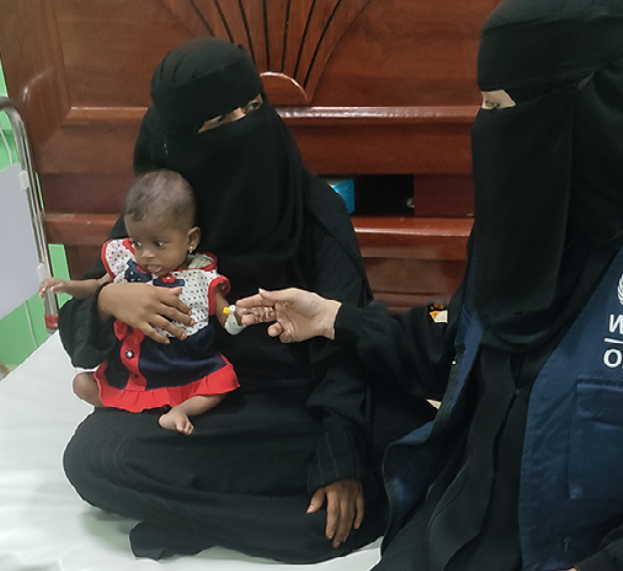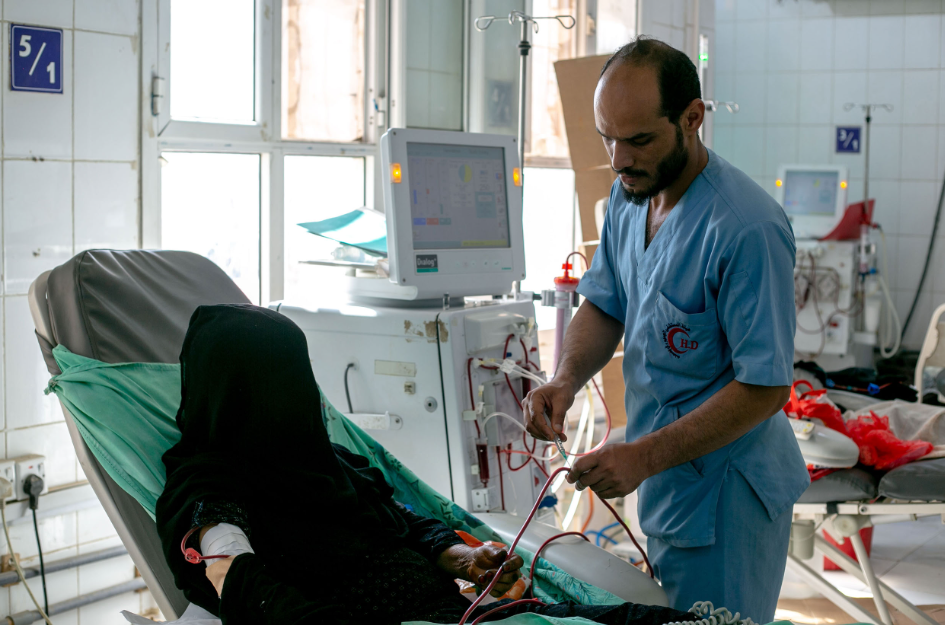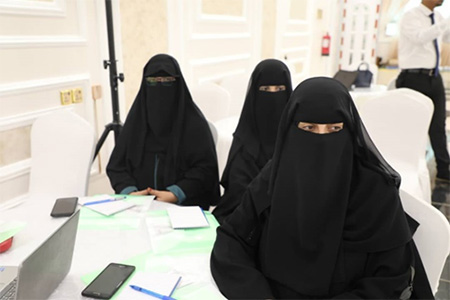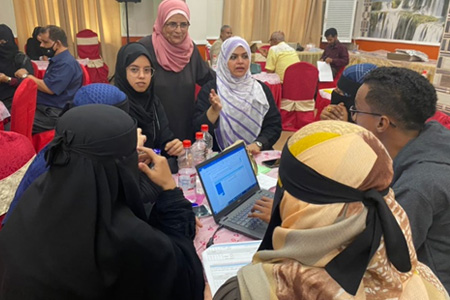The daily fight between life and death in Yemen

17 August 2023 – Five-month-old Malak lives with her mother and 2 siblings in Al-Mukalla city, an area affected by devastation as a result of the prolonged conflict. Like many of the babies and children in her area, Malak started her young life suffering from malnutrition as a result of her family’s extreme poverty. The youngest of the 2 siblings, Malak was born just before her parents divorced. Her mother was forced to become the sole breadwinner amidst the country's challenging socioeconomic situation.
The silent cries of hunger in Yemen
 18 August 2023 – After the conflict cast its shadow on Yemen, many families were forced to leave their areas of origin and flee to other locations for security and shelter. This was the case with Khaled's family, who fled their home in Al Hodeida to Aden for protection.
18 August 2023 – After the conflict cast its shadow on Yemen, many families were forced to leave their areas of origin and flee to other locations for security and shelter. This was the case with Khaled's family, who fled their home in Al Hodeida to Aden for protection.
Living in a camp for internally displaced people (IDP) after they left their hometown, Khaled's father struggled to find work, leaving them in with limited resources and unable to afford even the most basic food like plain bread. Hunger severely impacted Khaled’s health, and symptoms of malnutrition – swelling of the feet and hands with loss of appetite – began to appear.
A trip for life: sustaining life-saving health services in priority governorates of Yemen

15 August 2023 – While pregnant and waiting for the day she could finally hold her new child in her arms, she was faced with the devastating news of her medical diagnosis instead. Louza Saleh, from Sa’adah governorate, was pregnant with her third child when she started to feel extremely sick and lost her ability to walk. She was rushed to the hospital, where she was told the devastating news of her diagnosis of renal failure.
“My sickness started during my pregnancy, I bled a lot and didn’t know what was wrong. I became sicker each day, I lost my ability to walk, work and lead a normal life. That was when I doctors told me that I have a kidney failure and need to start doing dialysis sessions,” said Louza.
Improving quality of care: Yemen's pathway to universal health coverage
 20 July 2023, Aden | Sana’a – Quality of care is critical to improve health outcomes, patient satisfaction and cost-efficiency in health service delivery. That’s why WHO and the World Bank, via the Emergency Human Capital Project (EHCP), are collaborating with health authorities in Yemen to enhance the quality of health services using a multi-pronged approach.
20 July 2023, Aden | Sana’a – Quality of care is critical to improve health outcomes, patient satisfaction and cost-efficiency in health service delivery. That’s why WHO and the World Bank, via the Emergency Human Capital Project (EHCP), are collaborating with health authorities in Yemen to enhance the quality of health services using a multi-pronged approach.
In 2022 and 2023, five workshops were conducted in Aden and Sana’a to develop a situation analysis of quality of health care in Yemen. The workshops engaged 270 key focus group members (24% female) from community, facility, district, governorate and central levels. The feedback and insights from the focus groups revealed significant gaps in planning and quality-related regulations, weak organizational structures, a lack of qualified staff, poor financing and a weak information management system. Patient safety was also highlighted as an urgent priority. Ms Fullah Al-Akshar, Quality Manager at Jeblah Hospital in Ibb, appreciated the workshops, explaining “quality of care must be a priority for all health facilities”.
The resulting situation analysis will be used as a key reference in developing Yemen’s first ever national quality of care strategy. WHO Representative to Yemen, Dr Arturo Pesigan, explained the significance of this approach: “Developing a national quality of care strategy will be a huge step forward that will serve as a crucial foundation for reaching universal health coverage and rebuilding resilience among the Yemeni people. The strategy will encompass healing, dignity and hope, paving the way for improved health services.”
In recent years, WHO has also worked with health authorities to develop national quality standards and a quality indicator tool. In 2022, WHO engaged 30 hospitals and 43 primary health care centres to self-assess how well they adhered to quality standards. The self-assessment showed that only 38% of hospitals were fully applying the standards, with 47% partially applied, and 15% not applied. At primary health care level, application was lower, with 30% fully applying standards, 41% partially and 30% not applying. Concerns raised during the self-assessment included the lack of annual plans and budgets (37%) and an absence of infection prevention and control (IPC) programmes (30%). WHO then started working with the facilities to develop and implement quality improvement plans and projects based on their self-assessment results.
 In 2022–2023, 23 hospitals experienced a transformation in quality of care, thanks to WHO support. These hospitals now have appointed dedicated quality officials and introduced training for staff in quality and IPC programmes, funded using the hospital’s own resources. In addition, some hospitals have developed and are starting to implement quality policies and procedures. Progress is regularly monitored through virtual quarterly review meetings by WHO and Yemen’s Ministry of Public Health and Population, which have helped to streamline information-sharing and reduced costs by limiting the need for resource-intensive face-to-face meetings.
In 2022–2023, 23 hospitals experienced a transformation in quality of care, thanks to WHO support. These hospitals now have appointed dedicated quality officials and introduced training for staff in quality and IPC programmes, funded using the hospital’s own resources. In addition, some hospitals have developed and are starting to implement quality policies and procedures. Progress is regularly monitored through virtual quarterly review meetings by WHO and Yemen’s Ministry of Public Health and Population, which have helped to streamline information-sharing and reduced costs by limiting the need for resource-intensive face-to-face meetings.
In the coming months, WHO will continue working on quality of care at multiple levels, including guiding implementation of quality improvement plans at the facility level and consolidating inputs from stakeholders towards drafting the first national quality of care strategy, expected to be finalized before the end of 2023. This strategy will provide a key framework for improved quality of care, leading to better health services for the Yemeni population.


